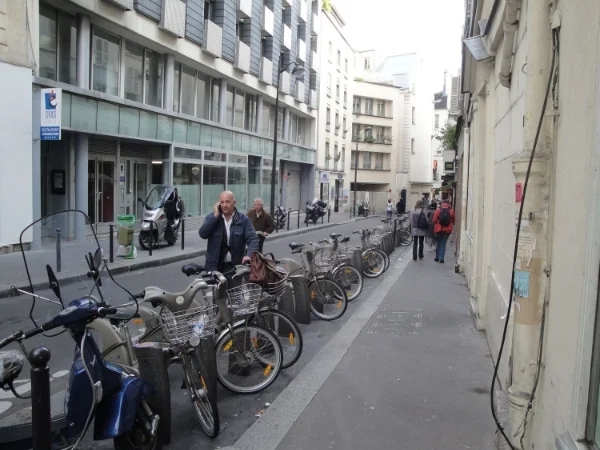The Velib in Paris
Eben Weiss writes on the one year anniversary of bike sharing in New York City:
There was, however, one expectation that the world’s most heavily scrutinized bike share system failed to meet: economic self-sufficiency.
As robust as the program’s user numbers were, it turned out that offering cheap annual memberships ($95) and relatively costly 24-hour passes ($9.95) was not the best pricing structure to underwrite the system. Initially, giving regular users more favorable rates supported the city’s claim that Citi Bike was a system “by New Yorkers for New Yorkers.” Now some say the system needs to look to tourists and short-term users for profitability.
He makes an important point here:
But was the goal of self-sufficiency ever reasonable? There is no form of public transportation that does not benefit from some sort of subsidy. New York City Transit, Metro North and the Long Island Rail Road cover less than half of their expenses with rider fares. The rest of their funding comes from taxes, toll revenues and state and local subsidies.
The city even subsidizes ferry service from the Rockaways and Bay Ridge, Brooklyn, to Pier 11 in Manhattan. This ferry has cost well over $3 million to date, and it has fewer than 1,000 riders per day. The only day the Citi Bike system had fewer than 1,000 riders was Feb. 13, when almost 10 inches of snow fell on the city.
I previously discussed the issue of funding of bike sharing and its pricing in this piece. Here's an excerpt, but I humbly offer it's worth reading the whole thing.
But the gist is this: if bike share has to rely on outside help to fund the service, it will always be at the whims of that outside help. So, if it needs local or state or federal government support, it will always be subject to politics. Those politics can be helpful or deadly, depending on who is in office. If it needs corporate support for stations, it will be at the mercy of those corporations.
Personally, I think the service is so good that it doesn't need those kinds of partners. At even $120/year, a membership would be a bargain. That's only $10/month for something many would use frequently as more stations are added. Heck, a bus pass often costs $30-40/month or more, ($60/month for CAT) and the bus can be a pretty lousy experience.
If you got value from this post, please consider the following:
- Sign up for my email list
- Like The Messy City Facebook Page
- Follow me on Twitter
- Invite or refer me to come speak
- Check out my urban design services page
- Tell a friend or colleague about this site

